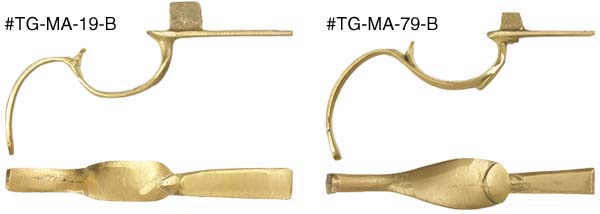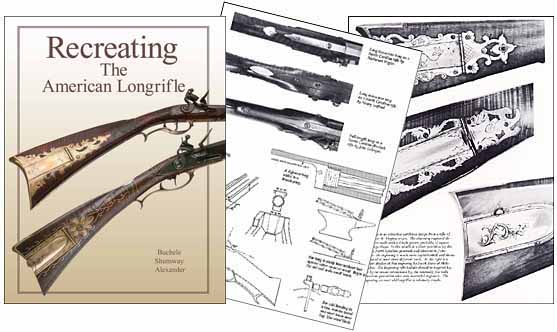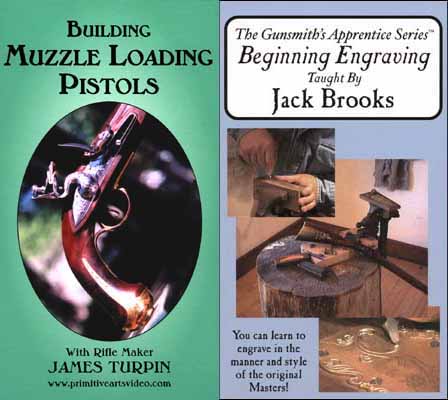Build Track's Kentucky pistol
with 13/16" straight octagon barrel,
L&R John Bailes flint lock
|
|
Build Track's flint lock Kentucky pistol parts set and replicate one of the rarest frontier accoutrement's. Building a Kentucky pistol requires all the same skills and techniques used to assemble a longrifle. Use of a drill press in recommended. A skilled mentor, as always, can be a invaluable aid in building any rifle or pistol project. Select a combination of caliber and available 13/16" octagon barrel, wood grade, brass furniture, and L&R John Bailes flint lock to begin your project.
Colerain Barrel Company offers a select few calibers in pistol barrels. Colerain straight octagon barrels are threaded to accept the breech plug. Colerain barrels are the favorite choice of today's best muzzle loading gun makers, because knowledgeable shooters demand Colerain's accuracy, inside and outside. Founded by two entrepreneurs, Scott Keller and Scott Kelly were tutored by Bob Paris, the famous rifle barrel maker who was first to perfect the technique for production of correct swamped barrels.
Colerain rifle barrels are cut rifled, with fancy radius groove rifling geometry, in correct twist rates for round balls:- Cut rifled, with .012" to .016" deep grooves, depending on caliber.
- 1 turn in 20" twist, in .45 or .50 caliber.
Colerain barrels are drilled from solid steel. Each barrel has six "round bottom" grooves, called "radius groove rifling". Colerain eliminates the sharp inside corner that accumulates fouling. Radius groove rifling cutters are a bit more expensive to make, but Colerain's customers agree that the accuracy, easy loading, and easy cleaning are worth the cost.
Stocks for our Kentucky pistol are carved from plain cherry, maple, or walnut. This Kentucky Pistol stock has a distinctive birds head grip, found on Kentucky pistols of the early to late flint period.
The barrel channel is inlet for your 13/16" octagon 10" or shorter barrel. Drilled for a 5/16" ramrod. Inlet for L&R John Bailes flint lock. We include a single trigger in our suggested list of parts.
Triggerguards: Select from one of four appropriate brass triggerguards to finish your Kentucky pistol. All triggerguards will require duburring, polishing, drilling, and bending to exactly match the stock profile. See our catalog for full size photos of these triggerguards.
#TG-MA-19-B: Sand cast brass, this is a typical Kentucky pistol triggerguard. Pistols from the American frontier rarely have a fancy finial.
#TG-MA-79-B: Sand cast brass, with a wide swell in the bow, which resembles our #TG-MA-121 flint fowler or longrifle triggerguard.
Sometimes called a small Manton, baby Durs Egg, or small English flint lock. This smaller lock is a fine London design, in the style of John Bailes, gunmaker. Correctly used on English pistols, rifles and dainty fowlers of the 1770-1810 period. After about 1780 this improved style of lock is found on American guns, having been smuggled here from England in quantity.
More complex than the small Siler lock, notice that the cock jaws point directly into the semi-waterproof pan. The unusual frizzen flange fits and seals the pan, keeping priming dry. The well designed tumbler and sear have raised bearing rings turned around axles, to minimize friction. Lock makers sometimes call this a "frictionless" or "ghosted" lock, because you can see through its internals, if viewed sideways.
A fly detent is fitted to the tumbler's mortise, preventing the sear from accidentally engaging the half-cock notch when fired. Suitable for use with plain or set triggers. Similar in size to the small Siler lock, to fit straight or swamped barrels 3/4" to 1" octagon at the breech.
Notice the "cut away" tumbler and "swing out" link, which greatly simplify lock disassembly. As you examine the photographs, notice the tumbler's lower arm is made to catch the mainspring if the tumbler arm or link should break while being cocked. Indeed, in the early days of metallurgy, this was the "weakest link" in this style of lock. But even if the link fails, this lock will fire its one last shot. Obviously John Bailes, the old London lock maker, was conservative! You can depend of this nice lock to spark well! Primed with a small amount of GOEX FFFFg, it is sure to fire. Don't cover the vent with priming.
Yes, the photo shows just how tightly the frizzen fits the pan. This lock plate is nicely polished bright, inside. All exterior parts are bead blasted to a matte gray, ready for browning.
Flash Hole Liner, touch hole liner, or vent liner, is an essential part of our kit. Our standard vent has the popular 1/4-28 thread. We also offer the Jim Chambers White Lightnin' vent as a option. The special 5/16-32 fine thread allows an extra large concave cavity inside, for use on swamped octagon barrels. Made in the USA, stainless steel, with removable lug for easy installation. Order our #TAP-5/16-32 tap and drill, if you prefer this special vent.
Concave inside, the White Lightnin' vent liner brings the main powder charge very close to the incandescent heat of the priming flash. Position the vent on the center of the pan, slightly above the pan to frizzen joint, sometimes called the "sunset" position. Covered by the frizzen when closed, the hole is a window centered on the heat of your priming flash, for instant ignition, without the whoosh-bang delay, seen in many flint guns.
Typically only the better quality London made guns were factory fitted with vent liners, but nearly all flint guns were later fitted with vent liners, after the vent hole in the barrel became worn from flash erosion, corrosion, or the aggressive use of a vent pick.
Gunsmithing Labor Options are a popular low cost method of speeding assembly. Our gunsmith can install the plug (#LABOR-BP), front and rear sights (2 #LABOR-DS), and underlugs (2 #LABOR-UL) at small extra cost, with prompt delivery.
#LABOR-BP: Our gunsmith will install your breech plug, in your barrel, with the front face of the breech plug tightly sealed against the inside shoulder of the breech thread, and the barrel maker's name indexed to the bottom flat. Threads are lubricated with Birchwood Casey's Choke Tube Lube anti-seize, so the plug may be removed, even after decades of use. Never remove a breech plug, unless you have a compelling reason. The plug is never removed for cleaning, and should only be removed by a skilled gunsmith, who has the correct tools to avoid marking your polished and finished barrel and plug.
#LABOR-DS: When you buy the sight from us, we will remove any burrs, gates, or parting lines, and hand fit the sight to the dovetail slot, ready for you to finish and use. Many of our rear sights are cast with an oversize base, to allow these to fill oversize slots. It is wise to allow us to trim these to a standard size, before installation in a new barrel. We must install the breech plug before installing sights, or underlugs.
Front sight slots are centered 1.5" from muzzle, unless your clearly specify another location. Do not embed special instructions within lengthy text of a letter. Place special instructions immediately after your written order for that item, or in the comment field of our on-line order form.
Rear sight slots are centered 3" from the breech end of the barrel (not including plug), unless your clearly specify another location. Do not embed special instructions within lengthy text of a letter. Place special instructions immediately after your written order for that item, or in the comment field of our on-line order form.
#LABOR-UL: When you buy the lugs from us, we will remove any burrs, and hand fit the lug to the dovetail slot, ready for you to finish and use. Allow our gunsmith to determine the best location for lug. Typically these pistols require two lugs. We require the breech plug to be fitted before performing this operation.
#BOOK-RAL: We strongly recommend Recreating the American Longrifle, by William Buchele. The late William Buchele was recognized as a true master longrifle maker. But his greatest contribution to muzzle loading must be this book. He shares the step-by-step details of his craft. His work has been enhanced by the editors. This book does not assume that the reader is an expert stock maker, but begins with illustrated explanations of the basic concepts. Buchele shows several alternate approaches to most tasks. This newly revised edition includes full scale plans for a carved flint longrifle, and fullstock flint pistol. Over 250 photos and drawings, within 176 pages, 8-1/2 x 11" format, soft cover.
#DVD-BMLP: Rifle maker James Turpin covers the basics in Muzzleloader Pistol Building. This tape includes the different steps necessary to build American and European style pistols. Also included is A "Furniture" repair to save a beautiful piece of curly maple. Both flint and percussion systems are covered. This is the third in a series of building tapes by James Turpin. DVD format, 135 Minutes.
#DVD-BE: The Gunsmith's Apprentice Series Presents "Beginning Engraving", taught by gunmaker Jack Brooks. With this video you can learn to engrave in the manner and style of the original masters.
In this presentation the nationally known traditional longrifle builder Jack Brooks teaches the viewer the essentials of chasing, pushing & wriggle engraving. Beginning with the basic tools, Jack shows the sharpening and heat treating of both square and chisel point engraving tools, and demonstrates the techniques used by period American gunsmiths to decorate their firearms. In addition, the engraving of several original 18th and 19th century longrifles is examined in detail. Over 70 minutes long. DVD format.
We also recommend our new catalog, which describes this kit in great detail, explains the options, and shows most individual parts in exact full size photographs. Prices may change, over the years, but the technical data, dimensions, instructions, and precise photos will make this 432 page book an essential too on your work bench.
Gun building is fun! Click ADD TO CART, and send your order, for same day shipment.







Track of the Wolf, Inc.
18308 Joplin St NW
Elk River, MN 55330-1773
Copyright ©
2025 Track of the Wolf, Inc.








